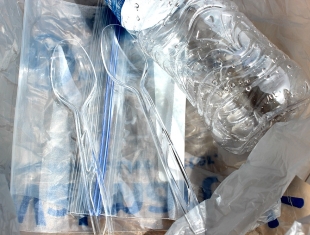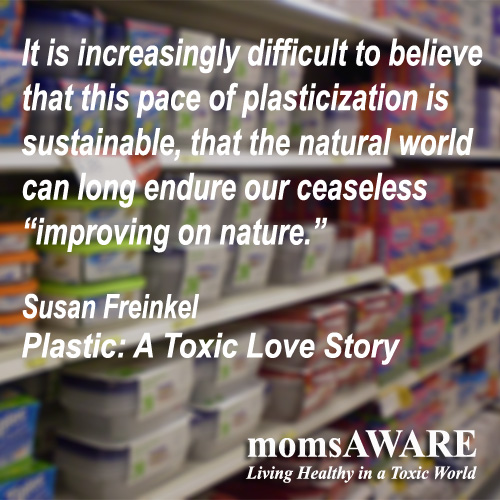 There is growing evidence that plastics and health don't mix. Plastic is the term used for a wide range of synthetic solids derived primarily from crude oil. Recent news stories have pointed to the hazards of bisphenol A (BPA), a hormone-disrupting chemical now banned from baby bottles and sippy cups. Phthalates, added to plastics to increase their flexibility, transparency, and durability, exhibit similar endocrine-disrupting properties.
There is growing evidence that plastics and health don't mix. Plastic is the term used for a wide range of synthetic solids derived primarily from crude oil. Recent news stories have pointed to the hazards of bisphenol A (BPA), a hormone-disrupting chemical now banned from baby bottles and sippy cups. Phthalates, added to plastics to increase their flexibility, transparency, and durability, exhibit similar endocrine-disrupting properties.
In light of the questions surrounding these chemicals, it makes sense to reduce our consumption. But how do we do it? Remember, a life free of plastics may not be a reality, but we can use less of them. Take your time. Small steps lead to big change.
Here are ten simple steps to living life with less plastic.
- Educate yourself. As we've seen with the tobacco industry, it can take years for the government to change their position on the health effects of a given product. Thanks to the Internet and other sources, we can do our own research. If you are considering reducing your exposure to plastics, it helps to know why. The following resources offer excellent starting points.
Articles:
Video:
- The film ALBATROSS offers a powerful look at the environmental implications of plastics.
Books:
- Plastic: A Toxic Love Story by Susan Freinkel (see her chapter discussing the history of plastics here)
- The Body Toxic by Nena Baker
- Invest in a reusable grocery bag. This is one of the simplest things you can do to help reduce your intake of plastic. While plastic shopping bags are not as great a health concern, they do have staggering environmental implications. The Washington Post offers this excellent chart detailing the pros and cons of paper vs. plastic, concluding that the reusable shopping bag is the best option.
- Invest in a stainless steel water bottle. Sales of bottled water have tripled in the last 10 years, with enormous environmental implications. The health implications are nearly as great. The Environmental Working Group found 38 pollutants in 24 samples from 10 major brands in a study conducted in 2008. The National Resources Defense Council says bottled water regulations have some serious holes. According to an Arizona State University study, the longer a bottle of water sits, particularly in elevated temperatures, the more leaching can occur of a chemical contaminant called antimony. When shopping for a reusable water bottle, avoid those made with aluminum, as they may be lined with BPA.
- Eliminate plastic shower curtain liners. Vinyl shower curtains emit DEHP, a phthalate and suspected carcinogen. Phthalates have been linked to hormonal disruption in humans. EVA (ethylene vinyl acetate) is a chlorine- and phthalate-free shower curtain option. Washable fabric curtains are chemical-free and can be laundered weekly to prevent mold growth. Glass doors are another excellent option.
- Keep only necessary receipts. Many sales receipts are coated with a layer of BPA. An Environmental Working Group study found that BPA in cash register receipts can be up to 1,000 times higher than the amount found in the lining of canned food. If you don't need the receipt, let the cashier know. If you do need it, keep it in the bag (away from fresh foods) until you get home. Keep your essential receipts in a closed container such as a paper envelope. For more on the chemicals found on receipts, see this article from Safer Chemicals.
- Stock up on glass jars and other glass containers. It can be overwhelming to think of disposing of your plastic containers. A transition to glass can be gradual. Need a new measuring cup? Buy glass. Looking for fresh ways to store leftovers? Consider wide-mouth mason jars. See more glass alternatives in our Resources section below.
- Cut down on canned and frozen convenience foods. Transition to fresh food. Allow yourself time to experiment with new recipes and cooking methods. Try a local farmers market. Explore food sources in your area. Look for canned food alternatives packaged in glass or BPA-free liners (see our Resources section below).
- Pack snacks and other on-the-go foods in parchment paper or reusable containers. It's hard to pass up the convenience of disposable plastic storage bags. Thankfully there are companies such as If You Care offering a parchment paper option. These may be a bit more costly in the short run, but they offer a much safer option. If you must use plastic bags, consider lining them with parchment paper before storing your food.
- Heat food in glass containers. Heat is one of the most significant ways harmful chemicals leach into your food. Even if your food has been frozen in plastic, transfer to a glass container before heating. Transfer take-out food immediately to glass containers and store until heated.
- Choose healthy cookware. Most nonstick cookware is coated with polytetrafluoroethylene (PTFE), a type of thermal plastic linked to birth defects, liver toxicity, cancer, and more. According to an Environmental Working Group report, a nonstick pan heated to 464 degrees will release numerous toxic particles. Healthier cookware choices include glass, enameled cast iron, or cast iron that is well maintained. To learn more about the safety of various cookware options, see our article on Safe Cookware.
Resources
BPA-free lining in canned foods:
- Eden Foods
- Edward & Sons Trading Co.
- The Soft Landing lists other BPA-free canned food options
Glass containers:
Stainless steel water bottles:
Packaging alternatives:
Other resources:
